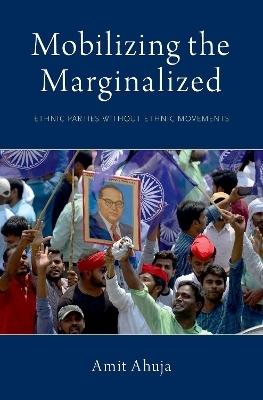
Mobilizing the Marginalized
Oxford University Press Inc (Verlag)
978-0-19-091643-5 (ISBN)
India's over 200 million Dalits, once called "untouchables," have been mobilized by social movements and political parties, but the outcomes of this mobilization are puzzling. Dalits' ethnic parties have performed poorly in elections in states where movements demanding social equality have been strong while they have succeeded in states where such movements have been entirely absent or weak. In Mobilizing the Marginalized, Amit Ahuja demonstrates that the collective action of marginalized groups--those that are historically stigmatized and disproportionately poor — is distinct. Drawing on extensive original research conducted across four of India's largest states, he shows, for the marginalized, social mobilization undermines the bloc voting their ethnic parties' rely on for electoral triumph and increases multi-ethnic political parties' competition for marginalized votes. He presents evidence showing that a marginalized group gains more from participating in a social movement and dividing support among parties than from voting as a bloc for an ethnic party.
Amit Ahuja is Associate Professor of Political Science at the University of California, Santa Barbara. His research focuses on the processes of inclusion and exclusion in multiethnic societies. He has studied this within the context of ethnic parties and movements, military organization, intercaste marriage, and skin color preferences in South Asia. Professor Ahuja's research has been supported by the National Endowment for the Humanities and the American Institute of Indian Studies, the National Bureau of Asian Research and the Woodrow Wilson Center for International Scholars, the Hellman Family Foundation, the University of California at Santa Barbara, and the University of Michigan.
List of Figures, Maps, and Tables
Preface
Acknowledgments
List of Abbreviations
1 Introduction
2 Mobilization and the Marginalized
3 Historical Dalit Social Mobilization
4 The Effects of Historical Dalit Social Mobilization
5 Dalit Party Performance and Bloc Voting
6 Dalit Social Mobilization and Bloc Voting
7 How Mobilization Type Shapes Dalit Welfare
8 The Identity Trap
9 Conclusion: Whither Dalit Politics?
Appendix A Focus Groups and Follow-up Interviews
Appendix B Locality-based Campaign Survey
Appendix C An Observational Study Assessing Caste Boundaries in the Indian
Marriage Market
Glossary
Index
| Erscheinungsdatum | 12.07.2019 |
|---|---|
| Reihe/Serie | Modern South Asia |
| Verlagsort | New York |
| Sprache | englisch |
| Maße | 234 x 160 mm |
| Gewicht | 363 g |
| Themenwelt | Sozialwissenschaften ► Politik / Verwaltung ► Staat / Verwaltung |
| Sozialwissenschaften ► Politik / Verwaltung ► Vergleichende Politikwissenschaften | |
| Wirtschaft ► Betriebswirtschaft / Management ► Unternehmensführung / Management | |
| ISBN-10 | 0-19-091643-5 / 0190916435 |
| ISBN-13 | 978-0-19-091643-5 / 9780190916435 |
| Zustand | Neuware |
| Haben Sie eine Frage zum Produkt? |
aus dem Bereich


